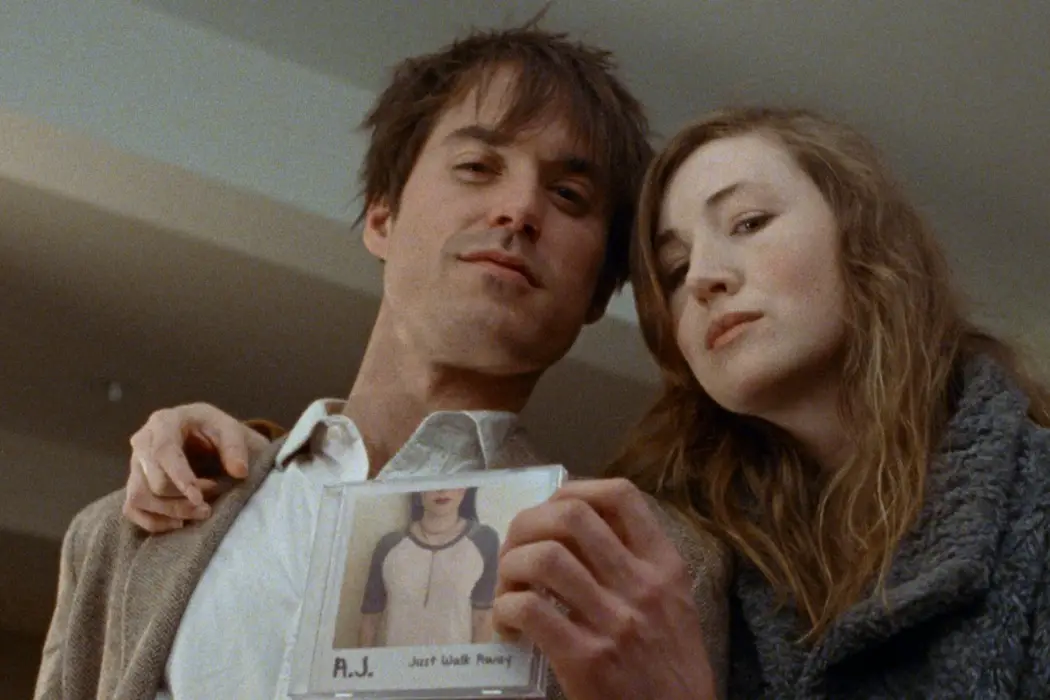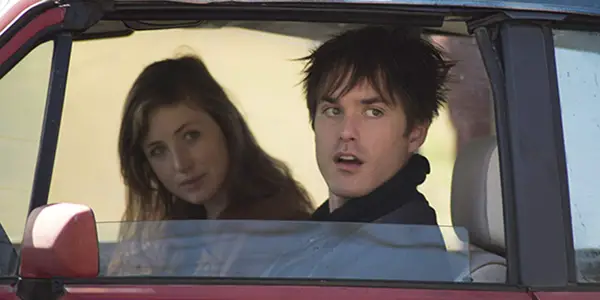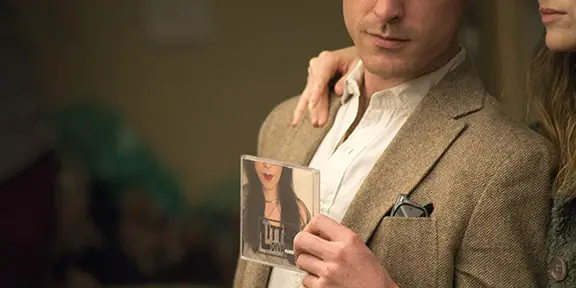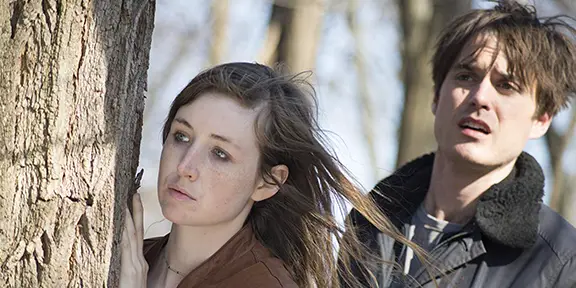LOST HOLIDAY: Lively, DIY Crime Caper Captures The Reluctance Of Accepting Adulthood

Brianna Zigler is a 23-year-old film journalist based in the…
“I just keep waiting for an adult to show up and take over, but it’s still just…me.” This is what Mark (William Jackson Harper) relays to his friend and once-high school lover, Maggie (Kate Lyn Sheil), over the phone, as she boards her bus to head back to her new life in New York City, along with their mutual high school friend, Henry (Thomas Matthews).
Mark heads back to work, while at the same time preparing for his impending marriage. His words to her are a sentiment that the entirety of Lost Holiday is built on as foundation: the malaise of growing up and realizing that all the most fun you ever had is behind you. That behaving childish, irresponsible, doing drugs and messing around is no longer easily overlooked and even endearing, but now more of a cause for concern. A sign of a mid-life crisis, a sign of a stunting in growth. Once you’re an adult, you know exactly what you’re supposed to be doing… right?

And yet, Mark’s words are resoundingly relatable, as many grow up to realize that adulthood neither enacts some important and necessary shift in personality like a caterpillar releasing from its chrysalis, nor does it come with a list of instructions. We’re all thrust into our teens thinking that once we reach our twenties, everything will become clear, but soon we’re in our twenties and it’s our thirties that will surely straighten things out for us. It’s hard to come to terms with the fact that everyone out here is running blind – some of us are just better at hiding it.
Lost Holiday captures that feeling of nostalgia for the destructive and carefree days of youth. The desire to regress back to the time when you didn’t have to be the adult, but a reminder of the consequences that come with trying to relive the glory days. There is an unfortunate responsibility that being an adult inherently brings, and it is depressingly inescapable.
A Christmas-time Conundrum
Maggie is home for the holidays from her big girl job in New York, where she reconnects with reckless high school friends Sam (Keith Poulson), Mark, and Henry at a Christmas party in their hometown. Maggie is clearly a child in an adult’s body, and whose social worker career is offset by the giant bear costume she wears as a coat while she’s awkwardly introduced to Mark’s fiancé-to-be. But the lingering effects of Maggie and Mark’s high school romance still permeates the room more densely and dejectedly than a cloud of their cigarette smoke, and Maggie eventually ditches the party with Sam and Henry.
The three of them make a visit to Sam’s drug dealer, Russian (Tone Tank), who gives them some coke, some acid, and lets them in on his latest cinematic endeavor: a sex tape of local socialite and pop singer, Amber Jones (Ismenia Mendes). Sam and Henry eventually leave, while Maggie sticks around for a little alone time with Russian, but she’s caught by a distraught Amber peeping through the window. Maggie crashes and wakes up to find her car window smashed in.

The next day, while at a bar, Maggie and Henry discover that Amber Jones has disappeared, the same Amber who Maggie saw angrily through Russian’s window last night while he was going down on her; the same Amber who smashed in her window. Seeking a respite from the boredom and heartache of coming back to her hometown, Maggie decides that she and Henry will become ill-advised, do-it-yourself detectives and crack Amber’s case all on their own.
It all comes across half like it’s supposed to – bored, thirty-somethings back home for Christmas, begging to relive the devil-may-care days of their adolescence illustrated by the film’s opening scene, which depicts our leads as high-schoolers having broken into an indoor swimming pool to mess around and makeout. But it also half comes across like disaffected, privileged white kids who can get away with most anything, wanting to allow themselves to feel something other than lethargy for once in their mostly unfulfilling adult lives. The way the pair of them dive unabashedly into attempting to solve a potentially dangerous kidnapping case – from tailing Russian to an unknown house, breaking into his car and stealing Amber’s debut pop album, to visiting the recording studio labeled on the CD owned by two sketchy guys with guns – it seems so without common sense that it sometimes feels less like it’s all out of boredom, and more out of apathy. Perhaps it’s both at once.
Both Charming and Chilling
Along the way, Maggie reckons with her unresolved feelings for Mark, as well as her conflicted feelings towards her own adulthood intertwined very much with the case itself. Not only is taking on this case a symbol of Maggie’s yearning for the past, but a disavowing of the unfulfilling nature of her current life. It both takes her back to the days when her actions had very little consequence; when acting out and misbehaving were just a part of the main course, but it also gives her a sense of true purpose. Eventually, Maggie and Henry realize that their plan for reckless self-fulfillment had a higher price than they realized, and they race to rectify their mistake before it takes a deadly turn.
The film has a prevalent Wes Anderson-y vibe, from the old-school film grain and comical pans and zooms, to the cheerful, woodwind instrumentals that mark the film’s score. It allows the audience to feel paradoxically comforted even when the story takes much darker turns, and gives off this level of safety that the lead characters will be alright. The chemistry between Henry and Maggie is utterly delightful, with their long-lasting friendship, though never delving much deeper than surface-level, made apparent through the ease with which they crack their ridiculous jokes to one another and encourage each other’s foolhardy behavior, while people at the sidelines gawk. It signifies that special bond between two weirdos who just “get” each other; who have maintained that level of trust and comfort for so long that they can not only be their true selves in each other’s presence, but are encouraged to transcend the acceptable level of ridiculousness as well.

While Lost Holiday does drag a little as it inches its way towards the finale, the way it captures the darkness inherent within disavowing your own adulthood is quite jarring. The film never strays away, despite its jolly, flute-filled music, from keeping you aware that Henry and Maggie’s actions are misguided, and watching them behave like delinquent children wells up feelings of pity for the pair. The reasoning for their quest is rooted in selfishness, boredom, and fear; fear of the lives that they’re already living and fear of the lives that they’ll never have again. While Maggie and Henry may very well believe their intentions to be pure, the ultimate goal for their quest is to free themselves from feelings of monotony as well as from the responsibility they’ve burdened themselves with by simply growing up.
Lost Holiday: Conclusion
After her phone call with Mark, while sitting on the bus boarding for her New York home, Maggie leans over to Henry sitting next to her and says with fervent glee: “We live in New York,” as if to convince herself that despite the events that transpired while they were in their hometown, the fact of living in that coveted location is in in itself a statement of her maturity. But what follows her declaration is an ending akin to The Graduate, as Maggie pulls away from the smiling Henry and her face gradually falls – the realization instilled within her that despite her age, occupation, and the city she lives in, Maggie still doesn’t feel like an adult.
And yet, she is one. And as adults, our actions have true consequences. Lost Holiday illustrates our inescapable desire for the days when irresponsible behavior was met with laughter and a slap on the wrist, but what happens when that responsibility is willfully ignored. It is jarring to remember that there is no longer an omnipresent adult with the authority to rectify situations for us, that we’re all on our own and it’s up to us to solve problems for ourselves and for others. Adulthood is not something than any of us asked for, but it is something that we must own up to. Otherwise, everyone would be running around naked, breaking into pools, doing coke, and waiting for the adult to come and takeover.
What are your thoughts on Lost Holiday?
Does content like this matter to you?
Become a Member and support film journalism. Unlock access to all of Film Inquiry`s great articles. Join a community of like-minded readers who are passionate about cinema - get access to our private members Network, give back to independent filmmakers, and more.
Brianna Zigler is a 23-year-old film journalist based in the Philadelphia suburbs and an alumni of Penn State University. She is a staff writer for Screen Queens, has bylines in Reel Honey Mag and Much Ado About Cinema, and has had a short story published in the horror literary journal Hinnom Magazine. She loves bad movies, Twin Peaks, and her pet parrot.













